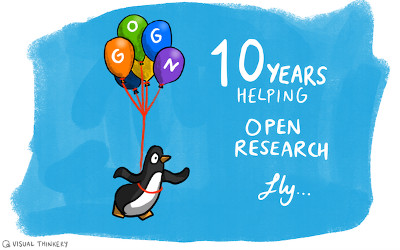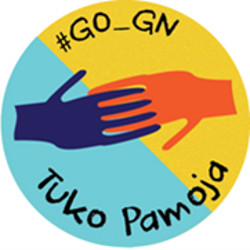You are here
- Home
- Open Research
- Examples of open research practice
- How the Global OER Graduate Network advances open research practices
How the Global OER Graduate Network advances open research practices

By Robert Farrow.
Open Research Week provides an opportunity for researchers to reflect on how openness can enhance practice through a more participatory research culture. Open research encompasses a range of practices aimed at increasing transparency, collaboration, and accessibility in scholarly work. The conversation around open research thus often focuses on open access publishing, preprints, and institutional repositories. While these elements are important, there is also often scope for opening up the entire research lifecycle. The Global OER Graduate Network (GO-GN) provides an example of how openness can be a fundamental organising principle which encompasses ways of acting, collaborating, and engaging with knowledge production.
GO-GN was founded in 2012 as a way to consolidate and support doctoral research in open education. Initially, there were nine PhD students and 19 experts in the network. GO-GN activities formally began in 2013. The first four annual seminars took place in Cape Town, South Africa; Ljubljana, Slovenia; Washington DC, USA; and Banff, Canada. Most of the researchers in this wave were focused on open educational resources (OER), reflecting the growing strategic significance of this approach to technology-enhanced learning.

In 2015, the coordination of the network moved to The OU where it remains: first under the stewardship of Professor Martin Weller (2015-2024) and, currently, myself and Dr Beck Pitt (since 2024). During the early years of GO-GN at the OU, the research focus areas supported by the network were widened to other open topics, including Massive Open Online Courses (MOOCs); open pedagogy; and open educational practices. The network has seen greater attentiveness to the exploration of open practice in research. GO-GN encourages researchers to apply open principles in their methodology, sharing research instruments, engaging in collaborative inquiry, and using open licensing to ensure knowledge is freely accessible. This makes research not just publicly available, but also co-created and participatory. GO-GN fosters a supportive research culture where members engage in open peer review, share feedback on work in progress, and co-develop knowledge in an openly collaborative manner.
The Open University (OU) was chosen as the new home of the network because of its expertise in OER research and open research practices. Face-to-face workshops and symposia continued, taking place in countries including Australia, Canada, Netherlands, Ireland, Italy, Poland and the UK. This was complemented by regular online activity, including a regular webinar series and social media operation. These would become especially important during the years of the COVID-19 pandemic.

The GO-GN pandemic response was coordinated around the concept of developing an informal, yet supportive, community of care, based on open values and practices. The GO-GN Research Methods Handbook was written during the first year of the pandemic and subsequently won the Open Education Global Open Research Award. Since then, a range of other GO-GN publications have been collaboratively authored, most of which are consolidated in The GO-GN Open Research Handbook, a comprehensive guide to doing research in the open education space.
Most recently, the network produced The GO-GN Guide to Doctoral Supervision. All the GO-GN publications are openly licensed to promote reuse, translation and repurposing. They are accessibly written, and GO-GN members share their inside perspectives as a form of open practice. These publications have found an audience much larger than its intended audience, which perhaps reflects a need for more accessible research guidance. It’s hard to know how people use and share open resources, but, as an example, the GO-GN Research Methods Handbook has been downloaded more than 20,000 times and is now integrated into several doctoral training programmes.
A defining characteristic of GO-GN’s approach to open research is its commitment to equity, diversity, and inclusion. Recognising that traditional academic structures often privilege researchers from the Global North, GO-GN actively supports scholars from underrepresented regions by providing funding, mentorship, and visibility. Through initiatives such as travel grants, open resources, and culturally responsive research practices, GO-GN creates pathways for diverse voices. The GO-GN network currently has 191 doctoral (and post-doctoral) members alongside 270 experts. Members are based in 29 different countries around the world, and 28% of our membership is based in the Global South. Many GO-GN alumni are now leading scholars in open education. Anyone can join GO-GN and membership is free. Our openly licensed resources are free for any doctoral students or supervisors to use to progress their work without officially joining the network.

All our members share an interest in open education as well as a commitment to open practices. The network includes scholars at all career stages, and supports their interactions by inviting a critical engagement with openness. In this sense, openness can be seen as a range of possibilities which can be adapted to needs. The GO-GN motto “Tuko Pamoja” - a Swahili expression meaning “We are together” - was proposed by our members as a way of expressing a shared outlook and commitment to collaborative effort.
The GO-GN demonstrates that open research need not be just about making publications and data freely available; it can be encultured as a way of thinking, organising, and engaging with the world. Moreover, research communities can be empowered by greater openness.
The GO-GN coordination team would like to gratefully acknowledge the ongoing and historical support of The William and Flora Hewlett Foundation.